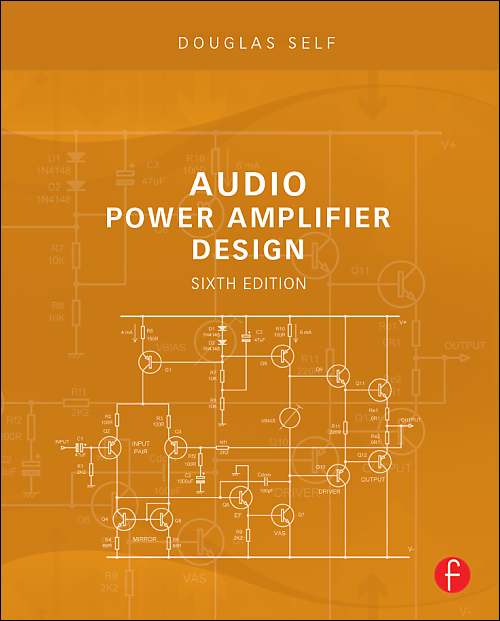
718 pages. ISBN 978-0-240-52613-3
Published by Focal Press, an imprint of Taylor & Francis.
Learn more about purchasing this book from:
The Focal Press Site
Amazon books UK
Amazon books USA
.
ERRATA
I try to make sure everything I write is wholly free from errors. I fail.
A few typos have been found which are listed here: Errata
.
|
| This is a uniquely detailed guide to the theory and practice
of audio power amplifiers, running from the elegantly simple
mathematics of the differential pair to the practicalities of
bolting down power transistors properly.
It includes the first complete explanation of the complex
business of power amplifier distortion. It shows how the many
sources of non-linearity can be eliminated or minimised,
allowing amplifiers to be designed and constructed with
performance that would have been thought impossible a few
years ago. It provides information that is indispensable
whether you are making one amplifier for the ultimate home system, or
setting up a production line to make 10,000 units a year.
THE CONTENTS INCLUDE:
New Findings in amplifier design
Science & Subjectivism
The Performance Requirements
How Negative Feedback really works
The Eleven Distortion Mechanisms
Diagnosis via distortion residuals
The input stage: how it can cancel distortion
The Voltage-Amplifier Stage
Output stages
Amplifiers and reactive loads
Anomalous loudspeaker behaviour
Interchannel crosstalk
Compensation, Slew-Rate, and Stability
Power Supplies and PSRR
Class-A amplifiers, with a design example
Class-G amplifiers
FET output stages
Load Invariant Power Amplifiers
Thermal compensation and thermal dynamics
Amplifier and Loudspeaker protection
Grounding systems
Mechanical design constraints
Testing, Fault-finding and safety requirements
NEW TO THE THE SIXTH EDITION:
The characteristics of the audio signal
The principles of distortion
Feedback intermodulation distortion
The five-stage amplifier architecture
Auxiliary amplifiers
Non-switching output stages
Error correction
VAS distortion explained
Push-pull VAS configurations
Output-inclusive compensation
Output inductor design
Power dissipation and design
A Brief History of solid-state power amplifiers
... and much more
In addition, five amplifier design examples that illustrate
important design principles are examined and measured in detail.
These can be straightforwardly adapted to specific requirements.
|











